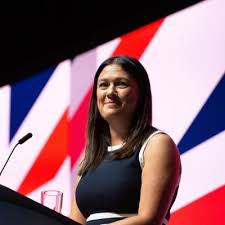UK Secretary Urges Educational Content on Social Media
In a letter to video-sharing websites like YouTube and TikTok, UK Culture Secretary Lisa Nandy urged companies to provide youngsters with better educational programming.
According to recent figures, children’s daily television viewing has decreased by over 70% from an average of two hours ten years ago.
According to Nandy, kids between the ages of four and eight were instead switching to streaming services like YouTube, TikTok, and others.
She said the government wanted to “open a dialogue” with the platforms initially, but that she would consider stepping in if they did not comply.
Nandy said, “A lot of content made in the UK is very high-quality content directed towards children. It helps inform them about the world, it helps with emotional well-being and development, and it’s very enjoyable as well.
“What we’re finding is that more and more children are moving on to video-sharing platforms like YouTube, finding their content, and it’s often not as high quality as the sort of content public service broadcasters and commercial broadcasters are producing, and that’s one of the concerns as a government.”
The show’s guest editor, former BBC presenter Floella Benjamin, called the platforms a “wild west” full of offensive material.
Nandy stated that although the government had already stepped up efforts to remove materials that were detrimental to children, she believed there was “a more profound point” regarding the calibre of the material that kids were being exposed to.
“There’s something great about YouTube, it’s democratising, you’ve got these people who start their careers from their bedrooms, But there’s a balance to be struck to make sure children can find that really good quality content.”
When asked about the 52% drop in funding for children’s television between 2002 and 2018, Nandy stated that she did not believe that increasing funding for children’s programming would be beneficial because there was evidence that the previous government’s young audiences content fund resulted in the creation of more content, but it did not reach kids who don’t watch TV.
She disagreed with Benjamin’s assessment that children’s TV was in crisis because it “genuinely is one of the crown jewels” in the UK, from CBeebies to Peppa Pig.
“The job of the government is to support that and help it to flourish,” she said, noting that it tended not to be very profitable.
Nandy said she found monitoring what her nine-year-old son was doing on his iPad “a challenge”, but acknowledged that video-sharing platforms’ filters were “very good”, and appreciated that his school had instilled a Newsround-watching habit in him.
As part of the public service broadcasting review, which is scheduled to report in the summer, she said she had written to Ofcom to request that the regulator give children’s TV priority and take the difficulties into account.
To attract investment from companies like Netflix, Amazon, and Disney, the government must strike the correct balance, she said, without “harming or crowding out uniquely British content.”
She noted that part of this was reaching deals with public service broadcasters that would allow them to get more of their material online while also paying them fairly for their labour and effort.
Manomsi Mallum/TheGuardian



Comments are closed.